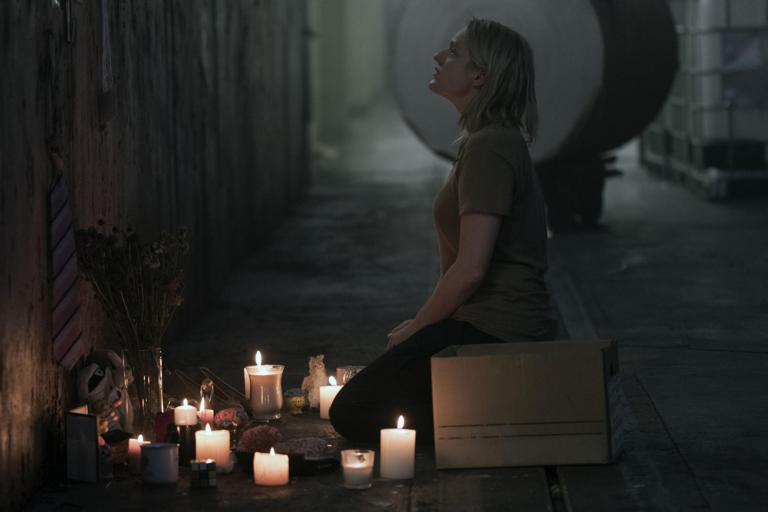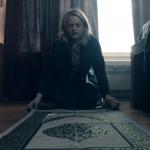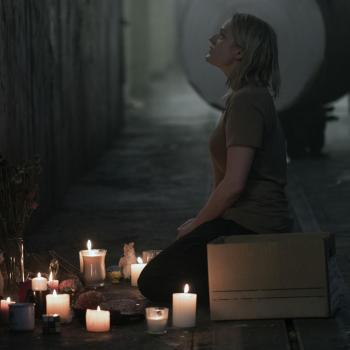It is ironic that some have treated the TV show The Handmaid’s Tale as anti-religious, when the show is profoundly religious in ways that this blog post (about the second and third episodes of the current second season) will explore. The reason for that reaction, however, relates very precisely to an aspect of the show’s message, which I may as well highlight from the outset: religions that start out as persecuted minorities regularly fail to recognize when they have transitioned from persecuted to persecutor. Indeed, some manage to maintain a persecution complex even when it is others who have just cause to claim about their behavior, rather than vice versa.

I’ve already blogged about the first episode of the season. In the second episode, we get some powerful scenes of both the present day, and in flashbacks of the process leading to the creation of Gilead. June is brought to an abandoned building to hide out in, one abandoned since before the war, and it is the headquarters of the now-defunct Boston Globe. This in itself says so much that is never explicitly stated. The way repression of a free press goes hand in hand with totalitarianism. We learn that those who worked at the newspaper were rounded up and executed. At the end of the episode, June gathers up the belongings of those who had worked there, there symbolic personal effects that once gave their desks a personal touch, and places them at the wall where they had been lined up and shot while others had been hanged. She adds candles, turning it into a shrine, and she prays to God for them.
This is not, in any sense whatsoever, an anti-religious show. It is a profoundly religious show. But it is anti-fundamentalist, anti-authoritarian, anti-bigotry, anti-oppression, and if someone takes that to mean anti-religious, then the chances are that they think they have a corner on religion, and that religion has bigotry, authoritarianism, and oppression inherently woven through its fundamentalist fiber. But the series’ story writers know, as Margaret Atwood did and as the show’s characters also do, that religion is much bigger than that.
I loved that the show also explored the backstory of Emily, who turns out to have been a university professor of microbiology. We see her taking a stand when a male student in a class tries to make a female student feel stupid even though the latter was correct and better informed than he was. And we see her unwilling to hide the fact that she is a lesbian when a colleague (probably her department chair) who is gay has hidden his partner’s photos. Eventually the latter is executed, hung from a noose with the word “FAGGOT” spraypainted on the ground underneath. But before that, they spoke about the direction their society had been heading, reversing an earlier trend. Emily says “They can’t scare us back into the closet.” Her colleague opines, “I thought mine was the last generation to have to deal with this bullshit.” Eventually Emily and her family try to leave for Canada, and her wife and child are allowed to leave while she is not. One of the armed guards tells her that she is not considered married, as that is against the law. When she asks which law, she is told “THE Law,” which we are given to understand means “God’s Law” which the forces taking power are now making the law of the land.
We also see the present day experiences of Emily in the colonies, digging radioactive soil with no protection. As a former mistress shows up there, having been found guilty of adultery, we see her praying too, crying out to God for protection and deliverance from that place that she and those aligned with her powerful governing class had created. And so we are reminded that religion can provide comfort not only for the oppressed, but for the oppressor. Exposing this isn’t anti-religious too, except in the sense that prophets are often accused of being, when they comfort the afflicted but afflict the comfortable.
I will blog about the third episode from this season tomorrow. But I wanted to focus in on this second episode in its own right, because it highlights the powerful religious message of the series. It is a direct challenge to those who claim that religion’s defining features are the stifling of others and the imposition upon them of one’s own convictions. And as with all good dystopian fiction, it takes what some claim to want, claim would be to our good, and carries it to its farthest extreme. Whether or not those around us today would ever want to see it taken to that extreme is not the point. The point is to ask whether we want to be heading in that direction at all. And then it offers strong religious grounds for why we should not.
The most compelling, perhaps, for those with true Baptist tendencies who emphasize the need for genuine personal faith and conviction rather than play acting or conformity under compulsion, is precisely the fact that the most genuine expression of piety is found not among the fundamentalist oppressors, but emerges spontaneously among the oppressed.
Tomorrow’s post will continue the exploration of these themes. Check back then to continue reading!













